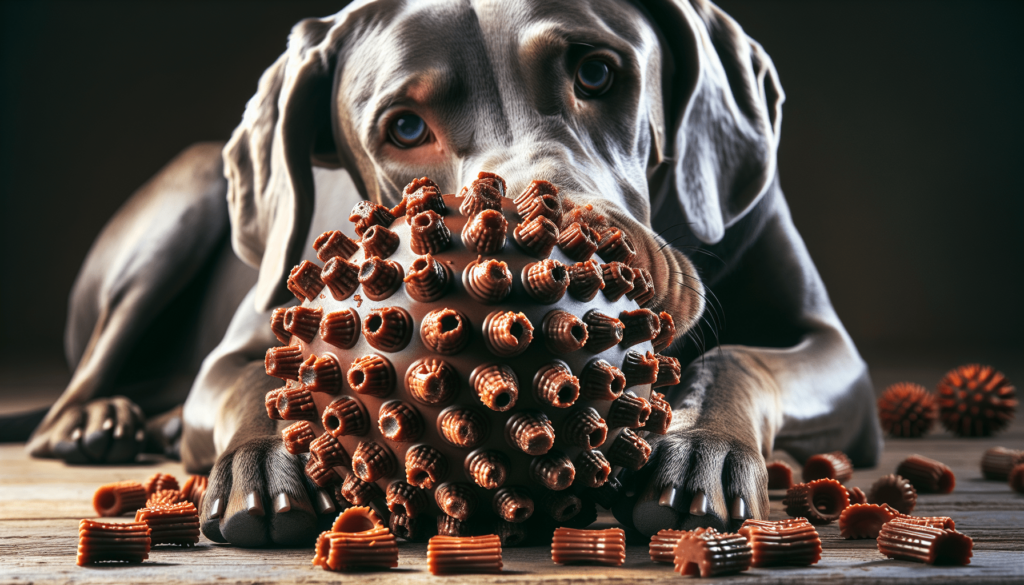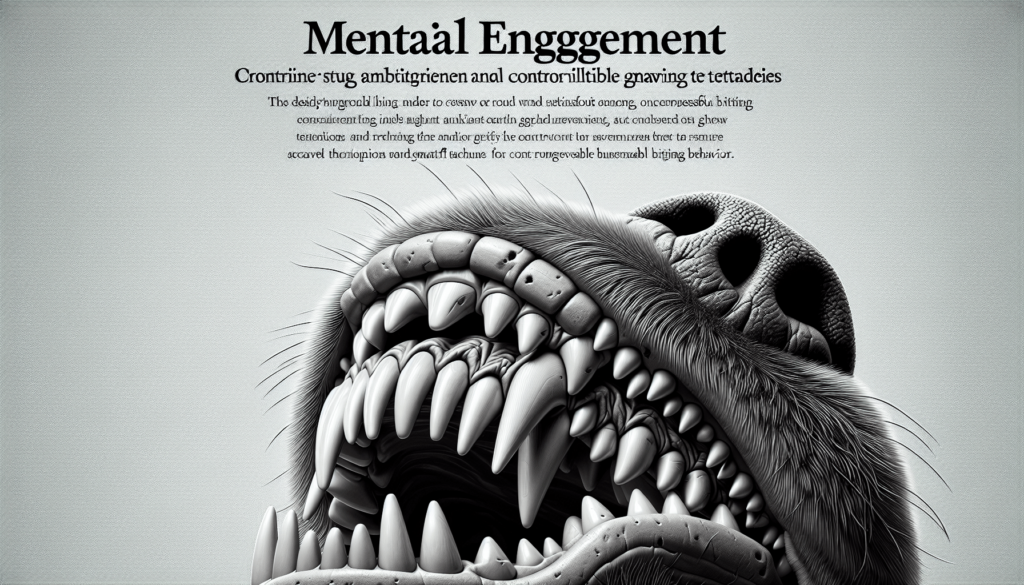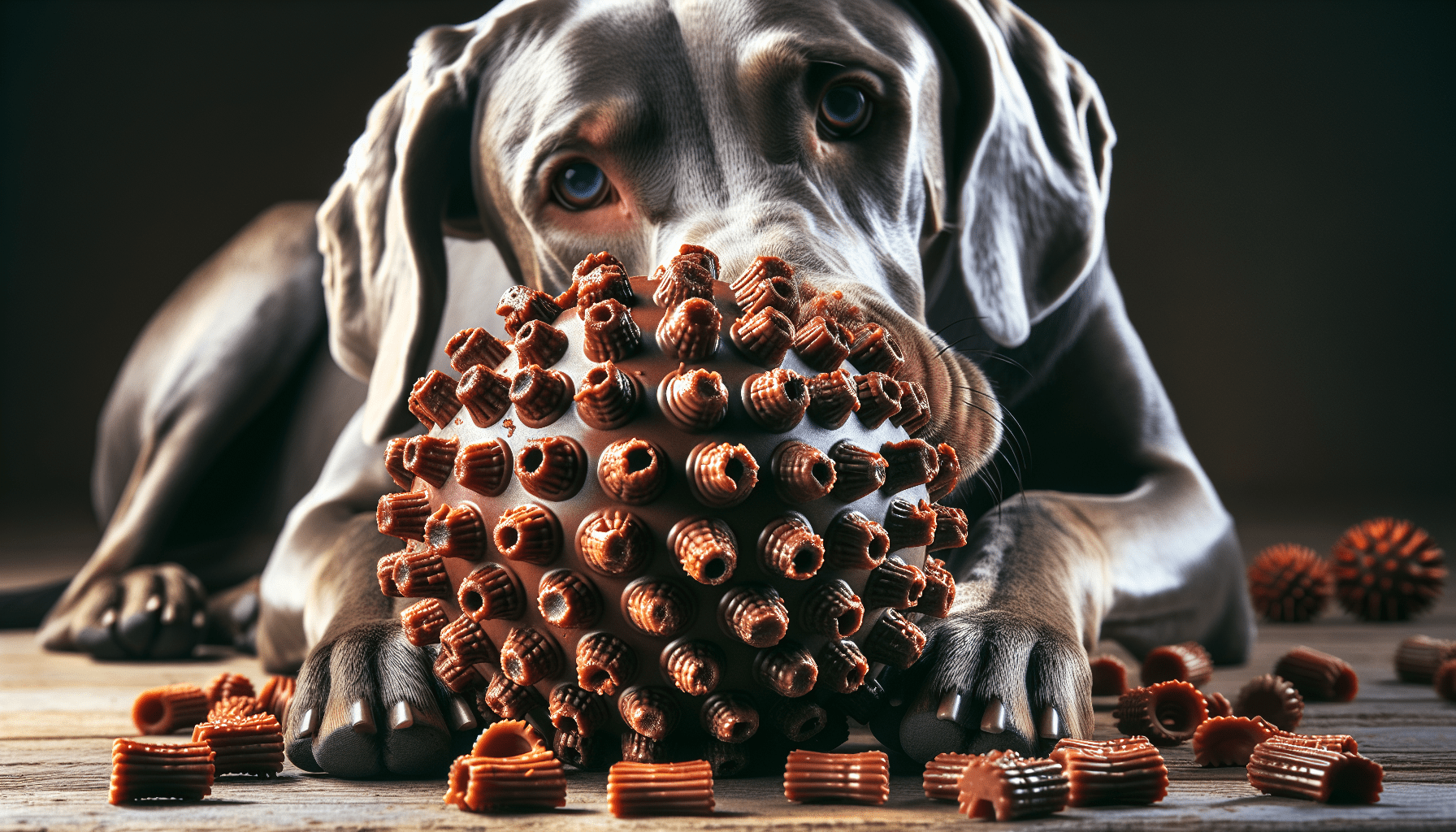If you’re the proud owner of a Weimaraner and find yourself faced with the challenge of preventing biting behavior, you’ve come to the right place. Dealing with this issue can be frustrating and concerning, but fear not! In this article, we’ll explore effective strategies and techniques that will help you address and prevent biting behavior in your beloved Weimaraner. From understanding the root causes to implementing positive training methods, you’ll be equipped with the knowledge and tools needed to foster a peaceful and gentle nature in your furry friend. So, let’s jump right in and discover the secrets to a bite-free Weimaraner!
Understanding the reasons behind biting behavior
Identifying triggers for biting
Before addressing biting behavior in Weimaraners, it is essential to understand the reasons behind it. Biting can be triggered by various factors, such as fear, aggression, playfulness, or even anxiety. Identifying these triggers is crucial in effectively addressing and preventing biting incidents.
Recognizing signs of aggression or fear
To intervene in a biting situation, it is imperative to recognize signs of aggression or fear exhibited by your Weimaraner. These signs may include growling, barking excessively, raised hackles, and a tense body posture. By staying vigilant and observing your dog’s behavior, you can intervene before a biting incident occurs and address the underlying cause.
Understanding the role of play biting
Play biting is a natural behavior in Weimaraner puppies, but it is crucial to teach them appropriate bite inhibition. Play biting is typically gentle and does not cause harm, but it is vital to distinguish it from aggressive biting behavior. By understanding that play biting is a form of communication and socialization for puppies, you can redirect this behavior towards more appropriate outlets.
Establishing a consistent daily routine
Providing regular exercise
One of the key aspects of preventing biting behavior in Weimaraners is providing them with regular exercise. These energetic dogs require daily physical activity to channel their energy positively. Regular exercise not only helps to release pent-up energy but also contributes to a well-balanced and content Weimaraner, reducing the likelihood of them resorting to biting as an outlet for excess energy.
Implementing mental stimulation activities
In addition to physical exercise, mental stimulation is crucial for Weimaraners. These intelligent dogs thrive on mental challenges and often engage in destructive behaviors when bored. By implementing mentally stimulating activities such as puzzle toys, obedience training, and scent games, you can keep your Weimaraner’s mind active and reduce the likelihood of them resorting to biting out of boredom.
Establishing a feeding schedule
Maintaining a consistent feeding schedule is another important aspect of establishing a daily routine for your Weimaraner. A regular feeding schedule helps promote a sense of structure and predictability in your dog’s life, reducing stress and anxiety. It also allows you to monitor their food intake and prevent any potential food aggression issues that can lead to biting behavior.
Socializing your Weimaraner
Introducing your dog to other people and animals
Proper socialization plays a significant role in preventing biting behavior in Weimaraners. Introduce your dog to a variety of people, animals, and environments from an early age. Gradually expose them to new experiences, ensuring positive interactions and minimizing fear or anxiety. By socializing your Weimaraner, you are helping them develop the necessary skills to interact appropriately with others.
Positive reinforcement during social interactions
During social interactions, it is crucial to use positive reinforcement to encourage your Weimaraner’s good behavior. Reward them with treats, praise, and affection when they exhibit calm and friendly behavior towards people and other animals. This positive reinforcement will strengthen the association between positive social interactions and rewards, decreasing the likelihood of resorting to biting.

Engaging in obedience training
Obedience training is an essential aspect of socializing Weimaraners and preventing biting behavior. By teaching your dog basic commands, such as “sit,” “stay,” and “leave it,” you are establishing a foundation of control and communication. Obedience training also helps to build a trusting and respectful relationship between you and your Weimaraner, reducing the likelihood of aggressive or fearful behavior.
Teaching proper bite inhibition
Using redirection techniques
To teach proper bite inhibition, it is important to redirect your Weimaraner’s biting behavior towards appropriate outlets. When they nip or bite, offer them a chew toy or a suitable alternative to redirect their focus and energy. Consistently reinforcing this redirection technique teaches them that biting inappropriate objects or people is not allowed while promoting appropriate chewing behavior.
Encouraging gentle play
During play sessions with your Weimaraner, it is crucial to encourage gentle play. Avoid games that involve rough play or encourage biting, as they can escalate into aggressive behavior. Instead, engage in interactive play that promotes positive interaction and gentle play biting, such as using soft toys or playing fetch. This helps teach your Weimaraner the difference between gentle play and aggressive biting.
Implementing appropriate consequences for hard bites
If your Weimaraner accidentally bites too hard during play or becomes overly excited, it is important to implement appropriate consequences. Immediately stop the play session, withdraw attention, and calmly walk away for a few minutes. This teaches your dog that biting too hard results in the end of playtime, promoting bite inhibition and discouraging excessive force.
Addressing fear or anxiety issues
Identifying sources of fear or anxiety
Fear or anxiety can be a significant factor contributing to biting behavior in Weimaraners. It is crucial to identify any potential sources of fear or anxiety in your dog’s environment. These may include loud noises, unfamiliar people or animals, or certain situations. By pinpointing these triggers, you can implement strategies to manage or desensitize your Weimaraner to these fear-inducing stimuli.
Seeking professional help if necessary
If your Weimaraner’s fear or anxiety issues persist or worsen, it may be beneficial to seek professional help from a veterinarian or an animal behaviorist. These professionals can provide expert advice, personalized training strategies, and potentially recommend medication or therapy options to address your dog’s specific needs. A professional’s guidance can greatly assist in effectively managing and reducing fear-related biting behaviors.
Implementing desensitization and counterconditioning techniques
Desensitization and counterconditioning are techniques commonly used to address fear or anxiety issues in dogs. By gradually exposing your Weimaraner to the source of fear or anxiety in a controlled and positive manner, you can help them become more comfortable and less likely to resort to aggressive behaviors, including biting. These techniques should be utilized under the guidance of a professional to ensure their effectiveness.
Offering appropriate chew toys and alternatives
Selecting durable and safe chew toys
Weimaraners have a natural inclination to chew, and providing appropriate chew toys is essential to redirect this behavior away from biting. Select durable and safe chew toys that are specifically designed for strong chewers. Avoid toys that could potentially break apart and become a choking hazard. By providing suitable chew toys, you are fulfilling your dog’s need to chew while protecting them from hazardous chewing behaviors.

Rotating and introducing new toys regularly
To keep your Weimaraner engaged and prevent boredom, it is important to rotate and introduce new chew toys regularly. By offering a variety of textures, shapes, and sizes, you keep their interest and curiosity piqued. Rotating toys also helps extend their lifespan and prevents them from becoming overly attached to a particular toy, reducing any potential guarding or possessive behaviors that may lead to biting.
Providing interactive puzzle toys for mental stimulation
In addition to chew toys, interactive puzzle toys are excellent for mental stimulation. They require your Weimaraner to work on problem-solving tasks to access treats or rewards. These toys engage their mind, provide entertainment, and promote appropriate chewing behavior. By offering a combination of chew toys and interactive puzzles, you provide a well-rounded outlet for their chewing instincts.
Consistently reinforcing positive behavior
Using positive reinforcement training methods
Positive reinforcement training methods are highly effective in promoting desired behavior and preventing biting in Weimaraners. Reward your dog with treats and verbal praise when they exhibit good behavior, such as appropriate play, calmness, or friendly interactions. Positive reinforcement encourages your Weimaraner to repeat these desired behaviors, reinforcing the idea that gentle and positive actions are rewarded.
Rewarding good behavior with treats and praise
When your Weimaraner displays positive behavior, it is important to reward them promptly with treats and praise. Immediate reward reinforcement strengthens the association between the behavior and the reward, increasing the likelihood of it being repeated. By consistently rewarding good behavior, you reinforce the positive habits while simultaneously discouraging negative biting behaviors.
Ignoring and redirecting negative behavior
In addition to rewarding positive behavior, it is crucial to ignore and redirect negative behavior when it occurs. If your Weimaraner exhibits biting behavior or any other undesirable actions, withdraw attention, and redirect their focus towards an appropriate behavior or chew toy. Ignoring negative behavior teaches your dog that such actions do not yield attention or rewards, reducing the likelihood of its repetition.
Avoiding aggressive play or rough handling
Discouraging rough play with humans
While play is important, it is essential to discourage rough play or aggressive behaviors with humans. Avoid any games that involve wrestling, grabbing, or intense physical contact that may trigger biting behavior. Instead, engage in gentle play activities that promote positive interaction and avoid any actions that may encourage aggressive behavior.
Educating family members and visitors on appropriate interactions
To ensure consistency in preventing biting behavior, educate your family members and visitors on appropriate interactions with your Weimaraner. Teach them how to read your dog’s body language and recognize signs of discomfort or fear. Additionally, instruct them on the importance of avoiding aggressive play and enforcing positive reinforcement techniques. By educating others, you create a safe and conducive environment for your dog’s well-being.
Using gentle correction methods when necessary
If your Weimaraner displays aggressive or biting behavior, it may occasionally be necessary to use gentle correction methods. This could involve redirecting their attention to an appropriate behavior or giving a firm, but not harsh, verbal command. Physical punishment should be avoided, as it can escalate aggression and damage the trust and bond between you and your dog.
Seeking professional help if necessary
Consulting a veterinarian or animal behaviorist
If your Weimaraner’s biting behavior persists despite your best efforts, it is crucial to seek professional help. Consult with a veterinarian or an animal behaviorist who specializes in canine behavior. They can assess your dog’s specific situation, identify any underlying medical issues, and provide expert advice tailored to your Weimaraner’s needs.
Following their guidance on training techniques
Once you have sought professional help, it is important to follow the guidance provided by the veterinarian or animal behaviorist. They may recommend specific training techniques or behavior modification approaches that align with your Weimaraner’s unique circumstances. Consistency and patience are key in implementing their recommendations effectively.
Considering medication or therapy options
In some cases, medication or therapy options may be necessary to address severe anxiety or aggression issues leading to biting behavior. If recommended by a professional, consider these options in conjunction with training and behavior modification techniques. Always consult with a veterinarian for proper evaluation, diagnosis, and supervision when considering any medication or therapy for your Weimaraner.
Understanding the limitations of punishment
Avoiding physical punishment methods
When dealing with biting behavior in Weimaraners, it is crucial to avoid using physical punishment methods. Physical punishment can lead to fear, aggression, and a breakdown in the bond between you and your dog. Biting issues are better addressed through positive reinforcement, redirection, and consistent training methods.
Recognizing the potential negative effects of punishment
Punishment techniques, such as yelling, hitting, or using aversive tools, can have detrimental effects on your Weimaraner’s behavior and overall well-being. These methods may heighten fear, anxiety, and even escalate aggressive tendencies in your dog. It is more effective and compassionate to focus on positive reinforcement and behavior modification techniques.
Prioritizing positive reinforcement and redirection instead
Positive reinforcement and redirection techniques should take precedence when addressing biting behavior in Weimaraners. By reinforcing good behavior, redirecting negative behavior, and consistently training your dog using positive methods, you create an environment that promotes trust, well-being, and prevents biting incidents. Focus on encouraging and rewarding desired behaviors rather than resorting to punishment as a solution.
In conclusion, understanding the reasons behind biting behavior, establishing a consistent daily routine, socializing your Weimaraner, teaching proper bite inhibition, addressing fear or anxiety issues, offering appropriate chew toys, consistently reinforcing positive behavior, avoiding aggressive play or rough handling, and seeking professional help when necessary are all vital components in preventing biting behavior in Weimaraners. With patience, consistency, and a loving approach, you can create a safe and harmonious environment for your Weimaraner, promoting positive behaviors and preventing biting incidents. Remember, always prioritize positive reinforcement and redirection methods to foster a healthy and happy relationship with your furry companion.
